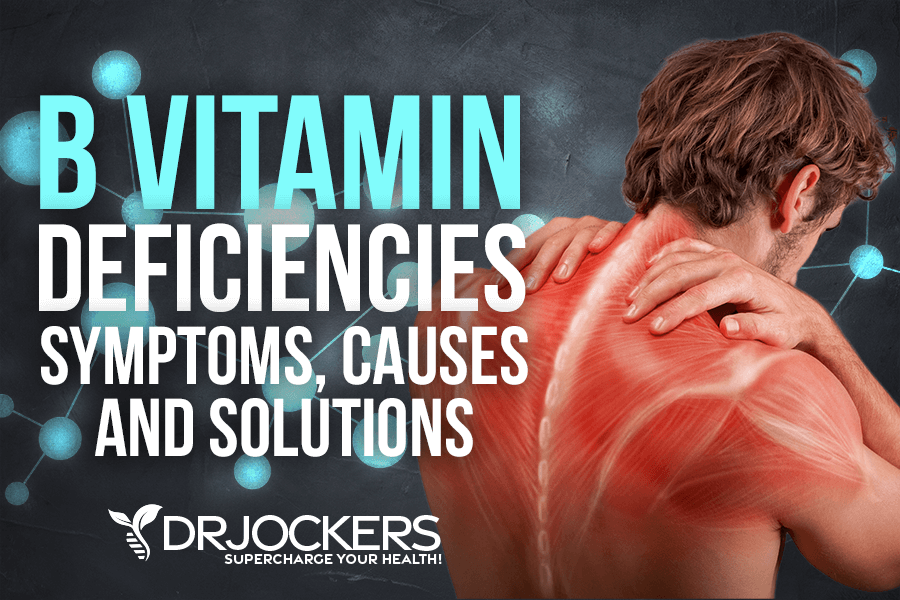 B Vitamin Deficiencies: Symptoms, Causes, and Solutions
B Vitamin Deficiencies: Symptoms, Causes, and Solutions
If you are dealing with fatigue, concentration issues, depression, anxiety, memory problems, weakness, skin issues, or other chronic symptoms, it may be time to check for B vitamin deficiencies.
B vitamins are a group of vitamins that are critical for your cellular health, brain health, hormonal health, metabolism, skin health, and other areas of your health. B vitamin deficiencies can result in an array of symptoms and serious health issues. Thankfully, it is easy to correct these deficiencies through a nutrient-dense diet and supplementation.
In this article, you will learn what B vitamins and B vitamin deficiencies are. I will go over the potential reasons for vitamin B deficiencies. You will learn the role of each B vitamin. I will discuss testing options for vitamin B deficiencies and share my recommendations for the best vitamin B supplements.
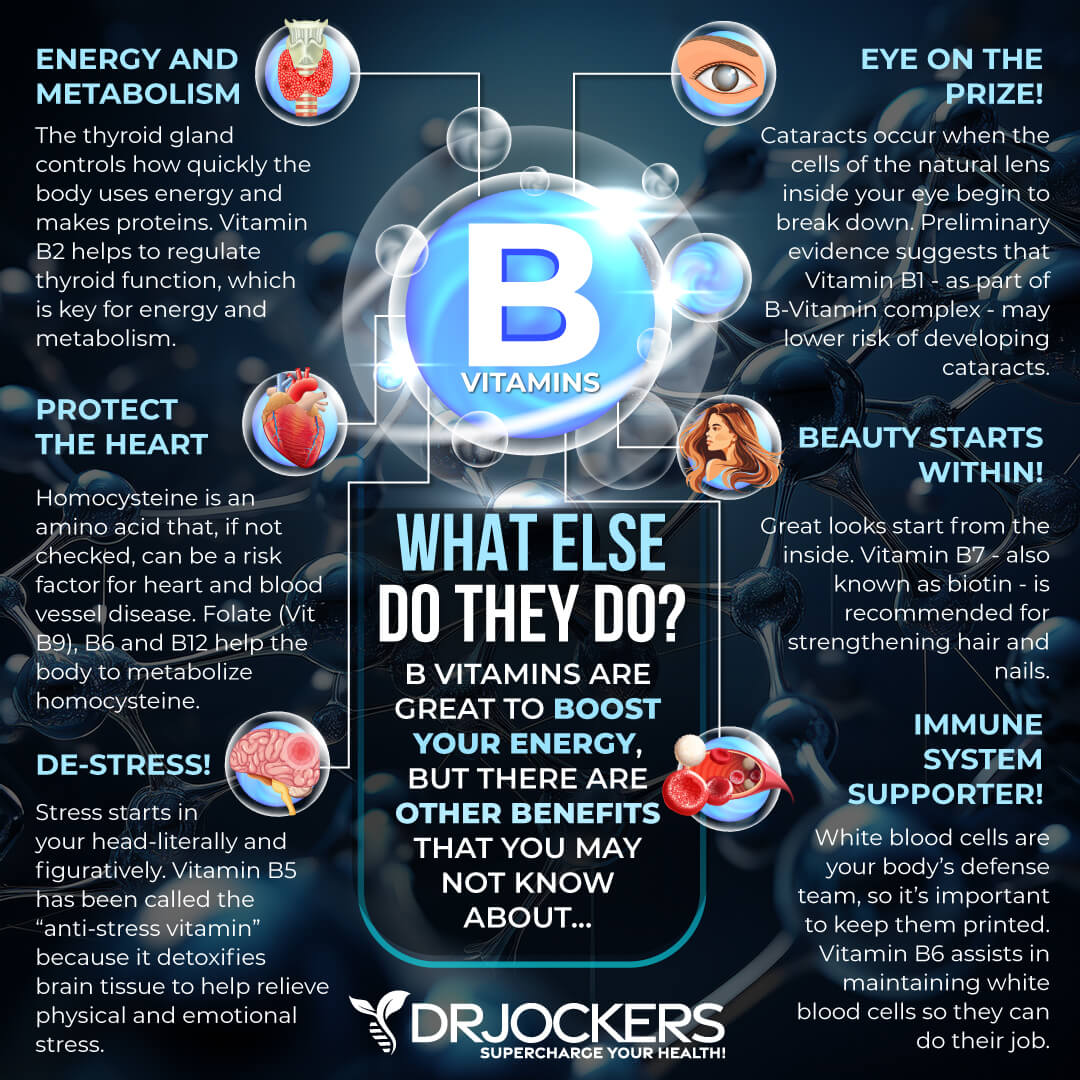
What Are B Vitamins
B vitamins are a group of vitamins that are essential for your body’s cells’ proper and healthy functioning. They allow your body to convert food into energy and support your metabolism. They also help to create new blood cells, support brain cells, support cellular health, and maintain healthy skin among other functions.
B vitamins include thiamin (vitamin B1), riboflavin (vitamin B2), niacin (vitamin B3), pantothenic acid (vitamin B5), vitamin B6, biotin (vitamin B7), folate (vitamin B9), and vitamin B12. Together, these B vitamins are called the vitamin B complex. Each of them has its own role and function, which I will go over later in this article.
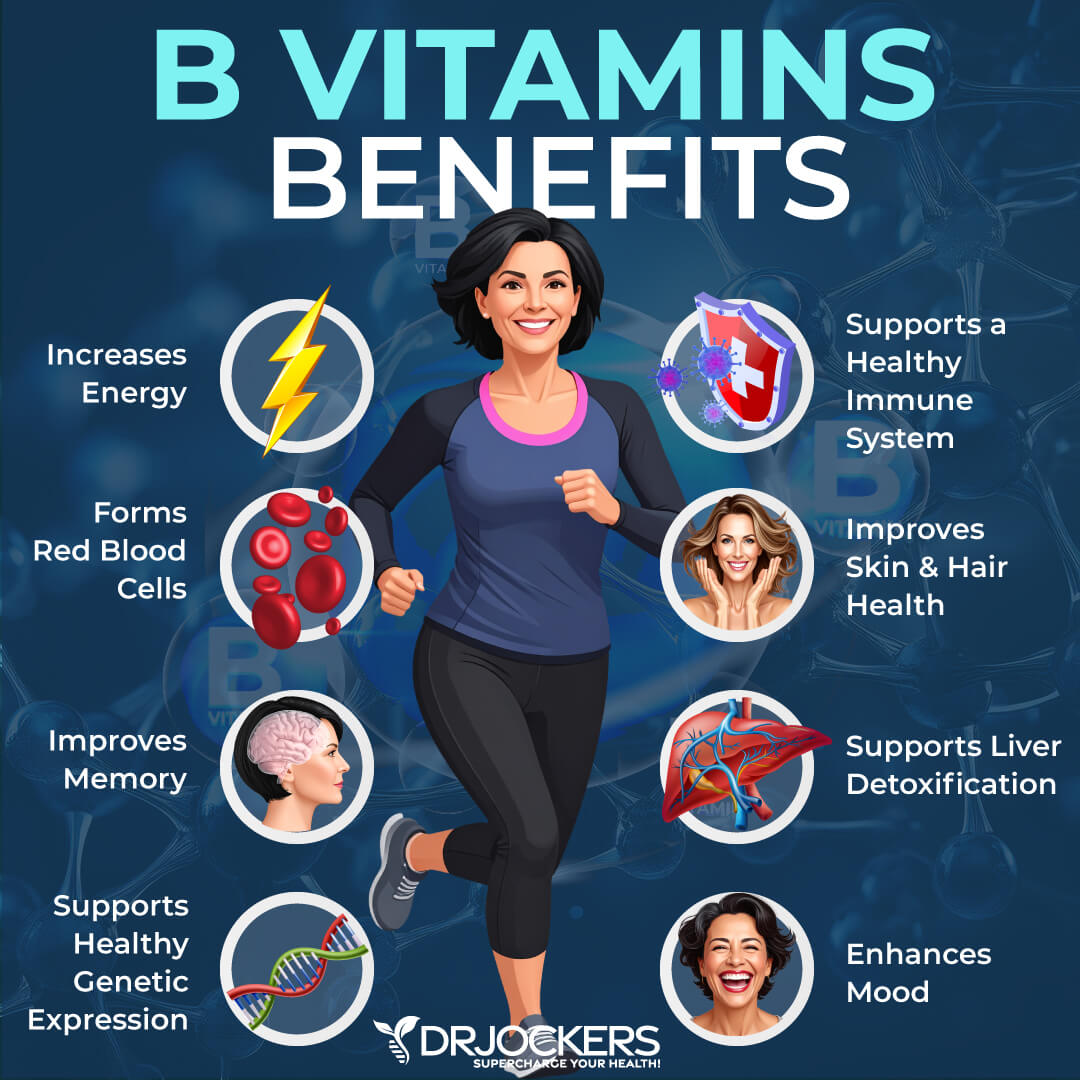
B Vitamin Deficiencies
When eating a nutrient-dense diet, meeting your vitamin B needs should be possible, however, many people still need supplementation to avoid vitamin B deficiencies. Vitamin B deficiencies are quite common and may develop due to a variety of reasons including a poor diet, poor nutrient absorption, gut infections, various health conditions, and medication use.
Symptoms of B vitamin deficiencies may include fatigue, weakness, confusion, memory problems, behavior changes, depression, mental health issues, pale skin, heart palpitations, shortness of breath, digestion troubles, and more (1, 2).
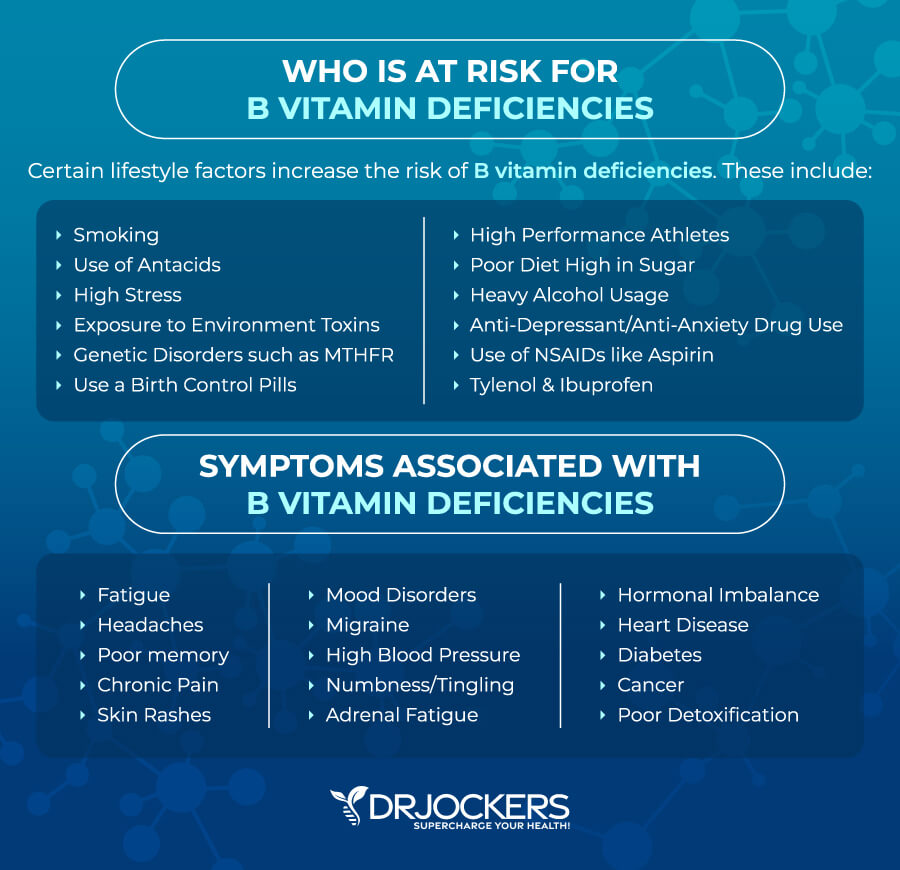
Reasons For B Vitamin Deficiencies
You may develop B vitamin deficiencies due to several reasons. Here are the top causes of B vitamin deficiencies and related symptoms.
Poor Diet
Eating a poor diet can lead to a variety of vitamin and mineral deficiencies, chronic symptoms, and related health issues. If your diet is high in sugar, grains, refined and processed foods, and low in vegetables and meat, your risks of developing B vitamin deficiencies increase.
Meat, organ meats, fish, eggs, dark leafy greens, mushrooms, seeds, and beans are some of the best sources of natural B vitamins. Eating a diet low in these foods makes it impossible to meet your needs.
Eating too much sugar, grains, processed foods, and other inflammatory foods increases inflammation, gut flora imbalance, and poor absorption, which can deplete your body of B vitamins and hinder your body’s ability to absorb the B vitamins that you are taking in.
Eating a nutrient-dense diet is not only important for taking in plenty of vitamin Bs, but also necessary for optimizing absorption. To learn about a nutrient-dense diet I recommend, reading this article.
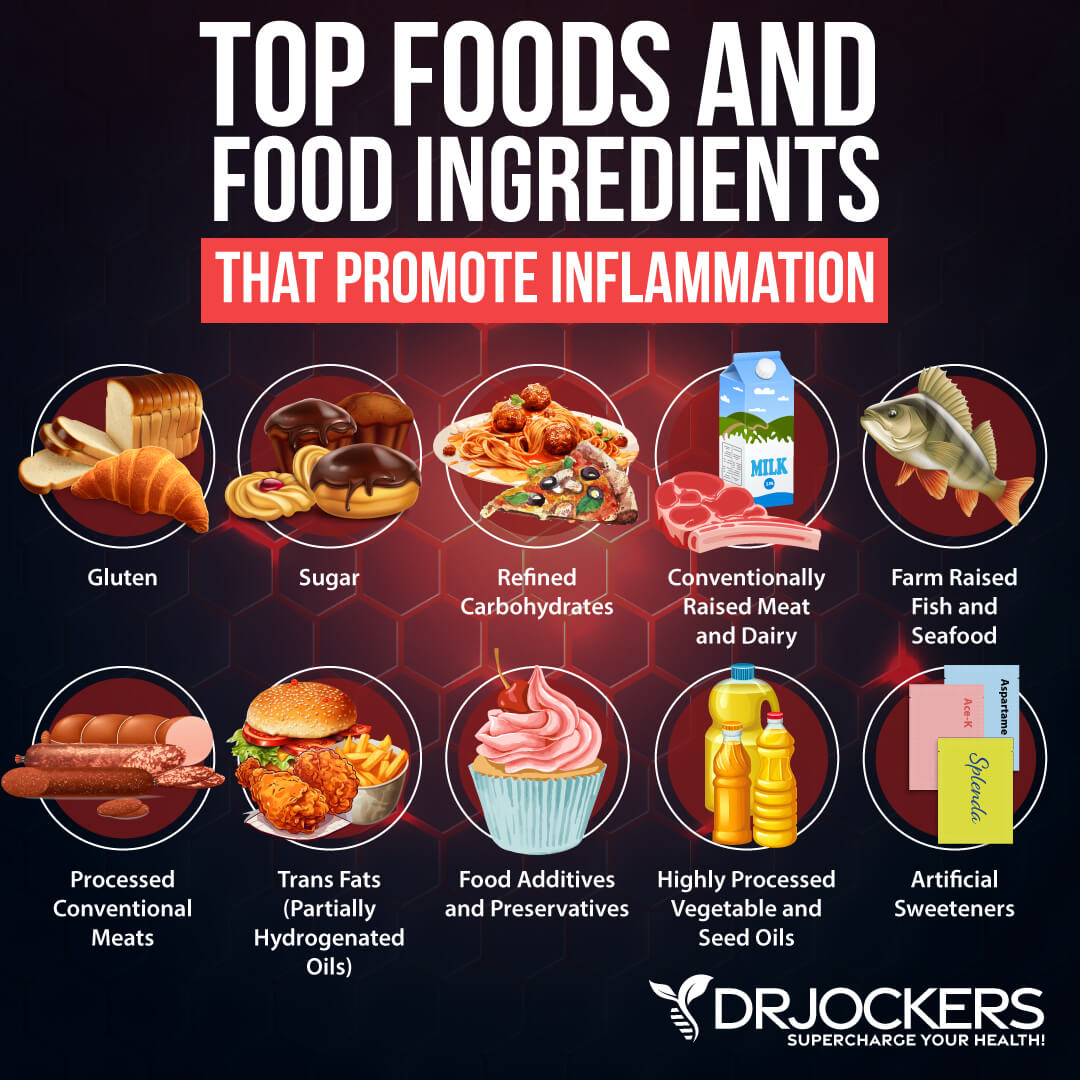
High Stress
Chronic and high stress can deplete your body with many B vitamins. Stress can be physical, mental, and emotional. Job stressors, family and relationship problems, a lack of social support, injury or illness, listening to the news, financial problems, depression, anxiety, a negative mindset, low self-esteem, moving, personal changes, and driving in traffic are all examples of common stressors people experience.
These issues become a problem when we are responding to them with fear, anger, sadness, or negativity. When high stress becomes chronic, it increases inflammation, pain, and health issues, and contributes to poor digestion, poor absorption, and the depletion of vitamins and minerals, including B vitamins.
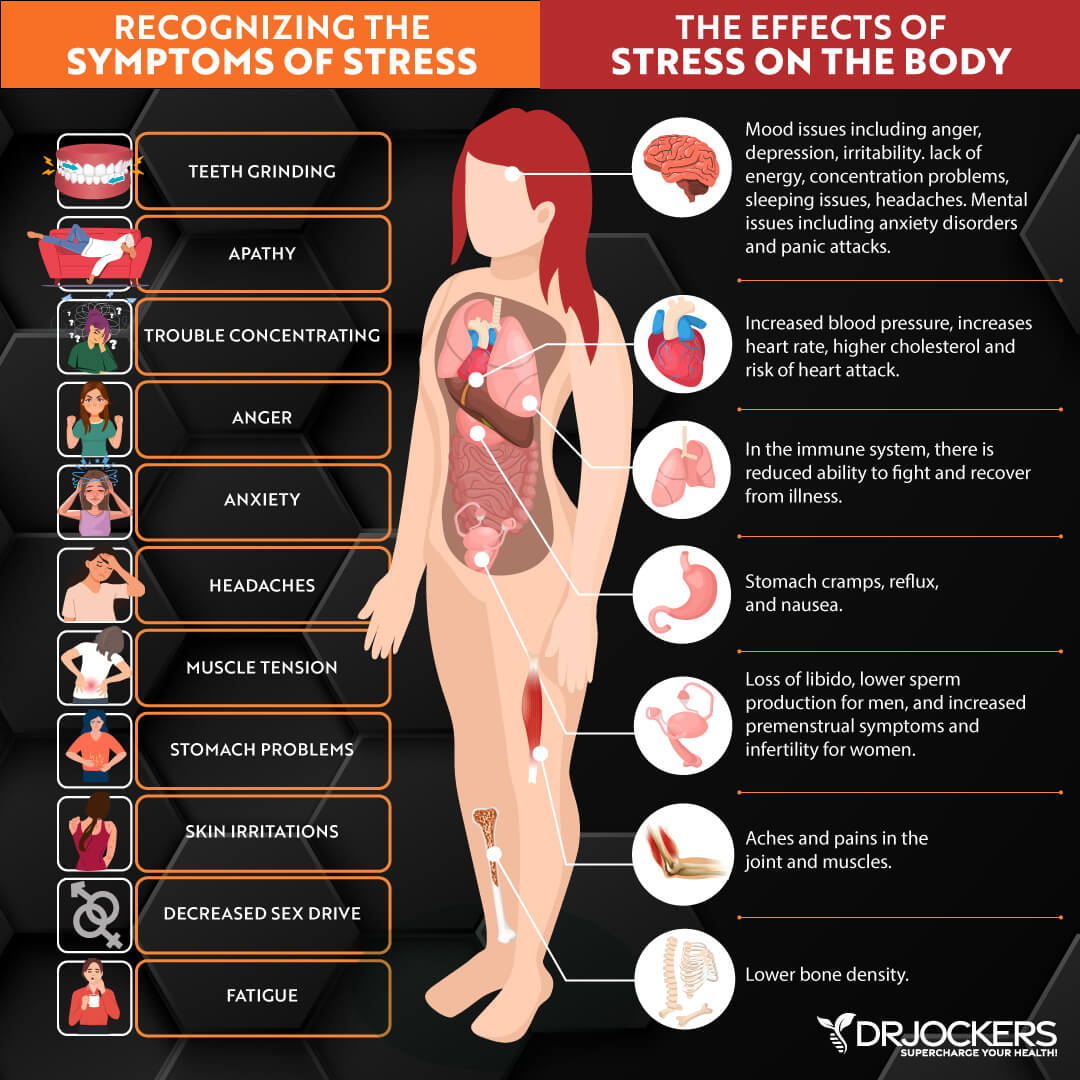
Poor Stomach Acid Levels
Your body requires an acidic stomach to effectively absorb vitamin B12. Poor stomach acid levels can lower vitamin B12 absorption.
Atrophic gastritis is a common condition that can affect older adults and decreases stomach acid levels contributing to vitamin B12 malabsorption and deficiency. Taking medications for acid reflux and heartburn long-term can also reduce your body’s ability to absorb vitamin B12 (3, 4).
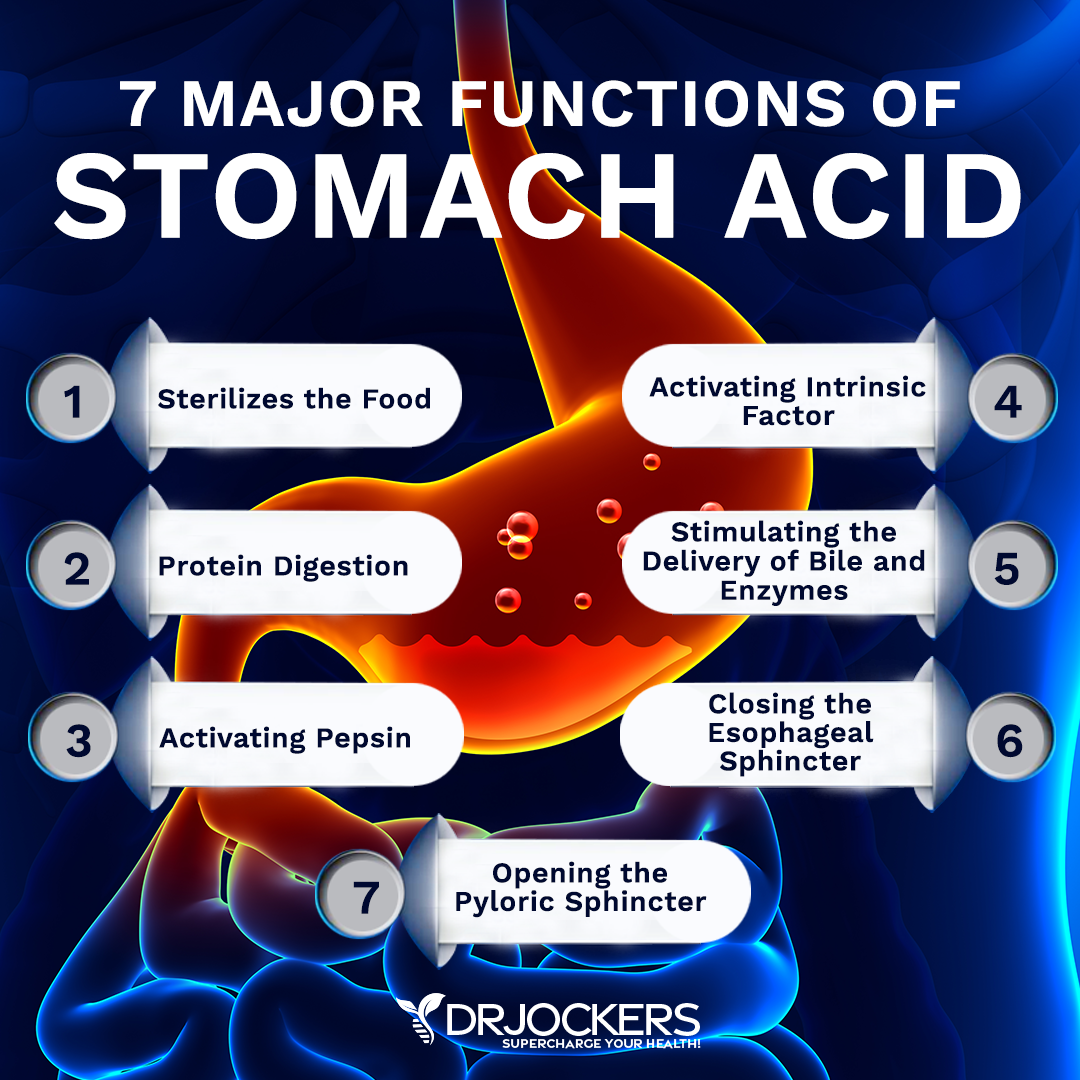
Gut Infections
Gut infections and poor gut flora balance can lead to vitamin B12 and other vitamin B deficiencies. Small intestinal bacterial overgrowth (SIBO) is one of the major causes of acid reflux, heartburn, bloating, gas, constipation, nausea, and diarrhea. It can also lead to B12 deficiency as all the extra bacteria overgrown in your small intestine intercept the absorption of B12.
Inflammation in your gut, including inflammatory bowel diseases, such as Crohn’s disease and colitis, gut infections, and gut problems caused by NSAIDs medication and antibiotics can also lead to an imbalance and interfere with vitamin B12 and other vitamin B absorption accompanied by digestion issues. Tapeworms and fungi in your gut can also steal B vitamins from your body leading to deficiencies.
To reduce the risk of vitamin B deficiencies, you need to address your gut infections and you need to introduce healthy microbes, such as that are necessary for the production of certain B vitamins. Research has, for example, shown that Lactobacillus acidophilus and pathogens such as Mycobacterium tuberculosis and Salmonella typhimurium are important for vitamin B2 and P. denitrificans and P. shermanii are important for B12 production (5, 6, 7).
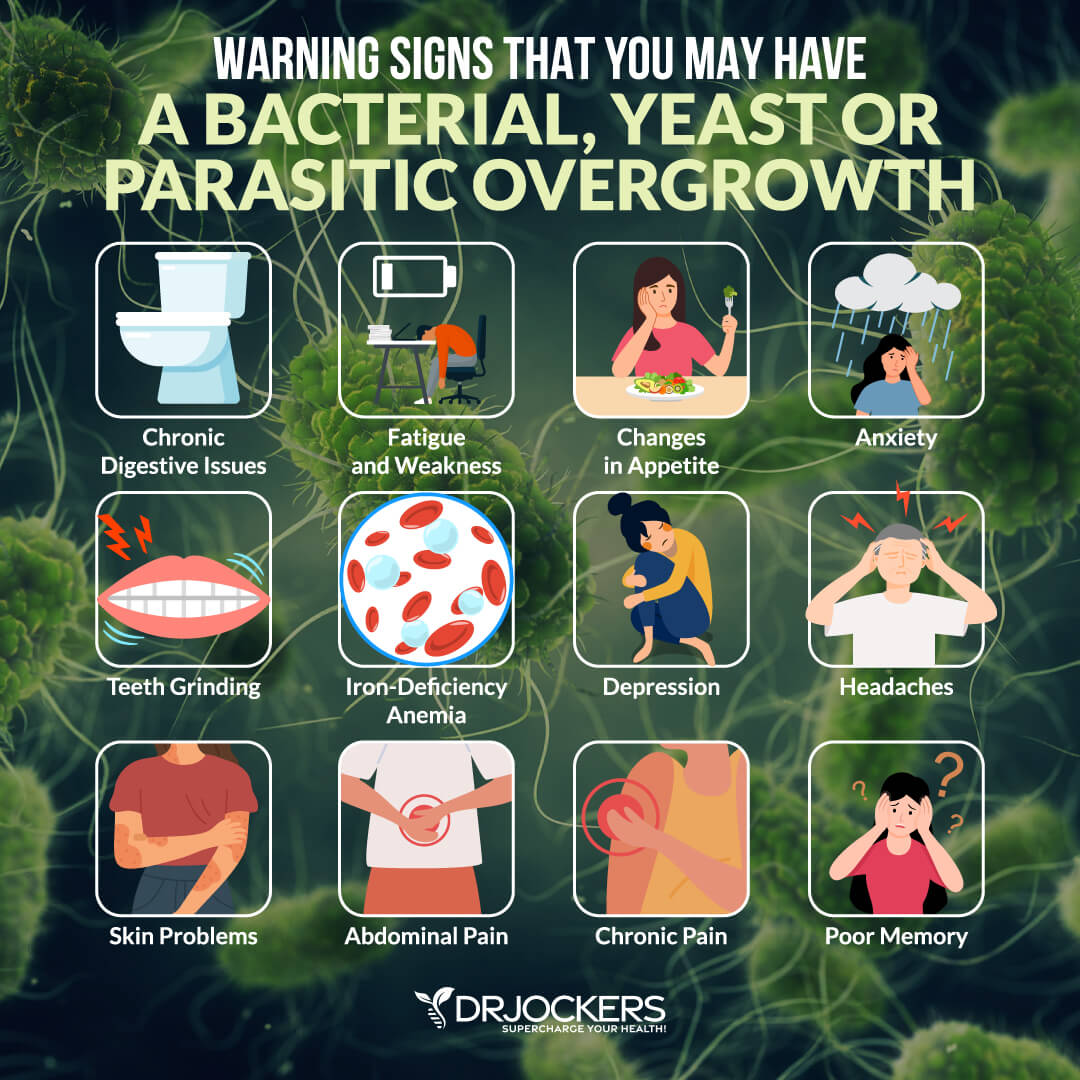
Medication Usage
There are a variety of medications that may deplete B vitamin levels. Some of these medications include heartburn and acid reflux medications, including H2 receptor blockers and proton pump inhibitors, metformin for diabetes chloramphenicol antibiotics, colchicine for gout, ethanol, and levodopa and carbidopa for Parkinson’s disease.
If you are taking medications and dealing with vitamin B or other nutrient deficiencies, it is important that you speak with your doctor about alternative medications and treatment options, lifestyle changes as part of your treatment, and vitamin B supplementation (8, 9, 10).
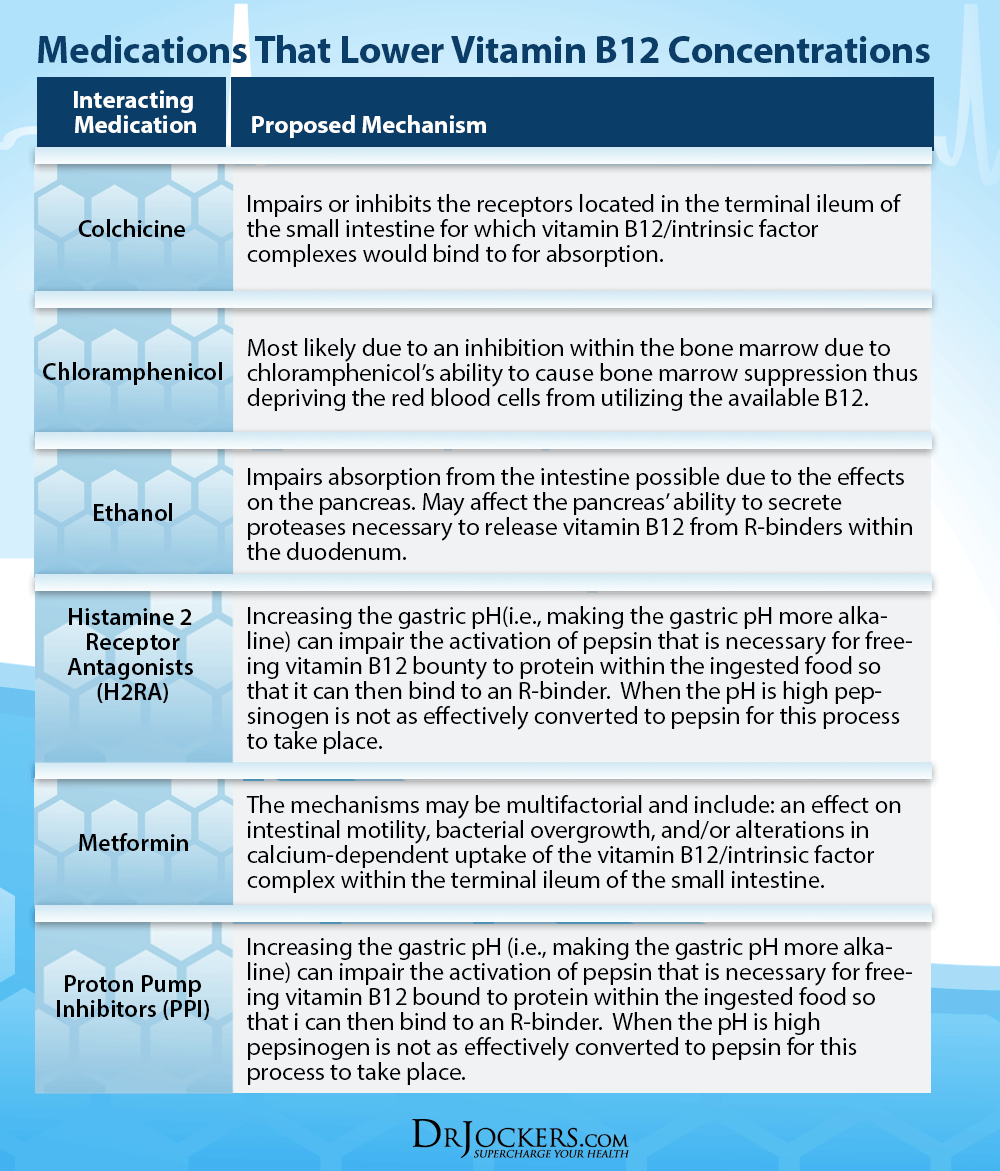
Genetics
Your genetics play an important role in your health and may interfere with your vitamin B levels and absorption. The methylenetetrahydrofolate reductase (MTHFR) gene is necessary to make the MTHFR enzyme.
The MTHFR is essential for a variety of biochemical reactions in your body, including methylation, which is the process of conversion of folate (vitamin B9) into methyl-folate. Methylation is critical for metabolizing B vitamins DNA cell function, detoxification, hormonal health, repairing damaged cells, sleep, mental health, and behavioral health.
Genetic mutations and variations are common and MTHFR gene mutations are affecting about half of the population. The problem is that MTHFR gene mutations can lead to methylation issues increasing your risk of fatigue, sleep issues, depression and anxiety, hormonal issues, allergies, food and chemical sensitivities, histamine intolerance, and other health issues. MTHFR mutations and consequent methylation problems interfere with your body’s ability to methylate and convert B vitamins.
To support your body if you have MTHFR gene mutations and methylation issues, it is important that you only take pre-methylated vitamin B supplements and take natural sources of B vitamins through a nutrient-dense diet rich in meat and vegetables. To learn more about MTHFR genes and enzymes, I recommend reading this article (11, 12, 13, 14).

Role of Each B Vitamin
Each B vitamin has its own role in your body and health. Let’s look at them one by one:
Vitamin B1: Thiamine
Vitamin B1 is also known as thiamine. It supports your adrenal function and helps to maintain a healthy nervous system. It plays a critical role in the metabolism of carbohydrates into energy and nerve transmission.
According to one study, supplementing with benfotiamine (S-benzoylthiamine O-monophosphate), which is the most bioactive form of supplemental thiamine, raises blood and tissue levels of thiamine at least five times than water-soluble salt and remained bioavailable 3.6 times longer than thiamine salt (15).
Best food sources of thiamine include Fish, chicken, grass-fed meats, sunflower seeds, black seeds, black beans, dark green vegetables, and pasture-raised eggs.

Vitamin B2: Riboflavin
Vitamin B2 is also called riboflavin. Riboflavin is critical for your metabolic functions. It is essential for recycling glutathione, a powerful antioxidant in your body. The best form of riboflavin is riboflavin 5’-phosphate sodium (R5P) because it is activated to perform at the highest utilization rate in your body.
Symptoms of vitamin B2 (riboflavin) deficiency include sore throat, redness and swelling of the lining of the mouth and throat, cracks or sores on the outsides of the lips and at the corners of the mouth, inflammation and redness of the tongue, and moist, scaly skin inflammation.
Best food sources of riboflavin include grass-fed raw cheese, almonds, grass-fed beef and lamb, salmon and other wild-caught oily fish, dark green vegetables, and pasture-raised eggs.
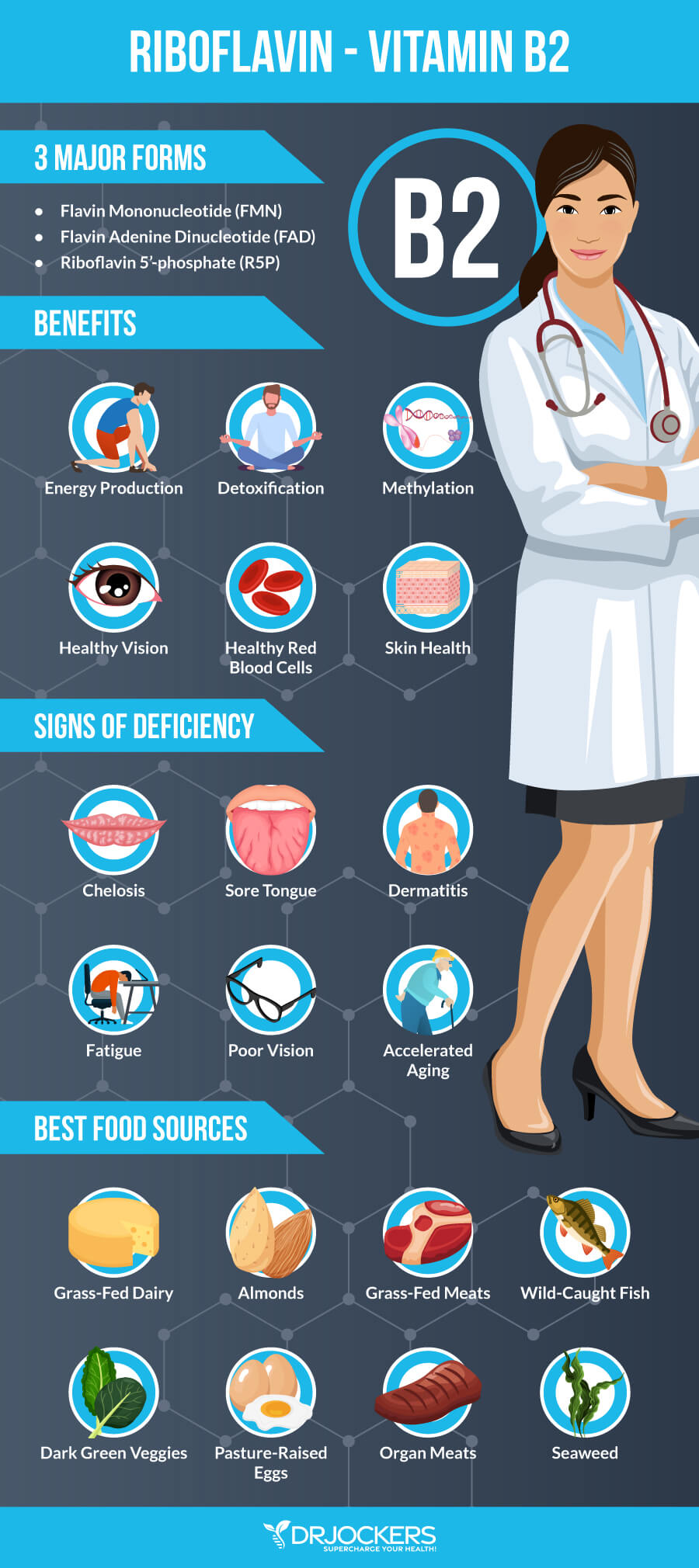
Vitamin B3: Niacin
Vitamin B3 is also known as niacin. It is essential for energy production in your body. There are two forms of niacin: nicotinamide adenine dinucleotide (NAD) and nicotinamide adenine dinucleotide phosphate (NADP). Both are necessary for the conversion of dietary fats, proteins, and carbohydrates for energy. Niacin is also necessary for synthesizing starches to be stored in your liver and muscles for energy.
When you are severely deficient in niacin, you develop a condition called Pellagra, which is characterized by inflamed skin, diarrhea, dementia, and sores in the mouth. The areas of the skin that are exposed to friction or sun exposure are typically impacted first.
Best food sources of niacin include: tuna, wild-caught salmon, pasture-raised chicken and turkey, liver, and grass-fed beef

Vitamin B5: Pantothenic Acid
Vitamin B5 is also known as pantothenic acid. It supports your body through the incorporation into a molecule, coenzyme A (CoA), which is essential for energy metabolism and helps fats, proteins, and carbohydrates be used as fuel sources.
Research has shown that vitamin B5 is critical for skin health, including reducing skin spots, redness, and other signs of aging. It is also essential for the production of sex- and stress-related hormones.
Vitamin B5 deficiency is rare but may include symptoms such as fatigue, insomnia, depression, irritability, vomiting, stomach pains, burning feet, and upper respiratory infections. While a deficiency is rare, many people have sub-clinical symptoms that lead to lower stress resilience, daytime fatigue, and mental lethargy.
Best food sources of vitamin B5 include eggs, avocados, mushrooms, oily wild-caught fish, such as trout and salmon, cabbage, and grass-fed raw cheese.
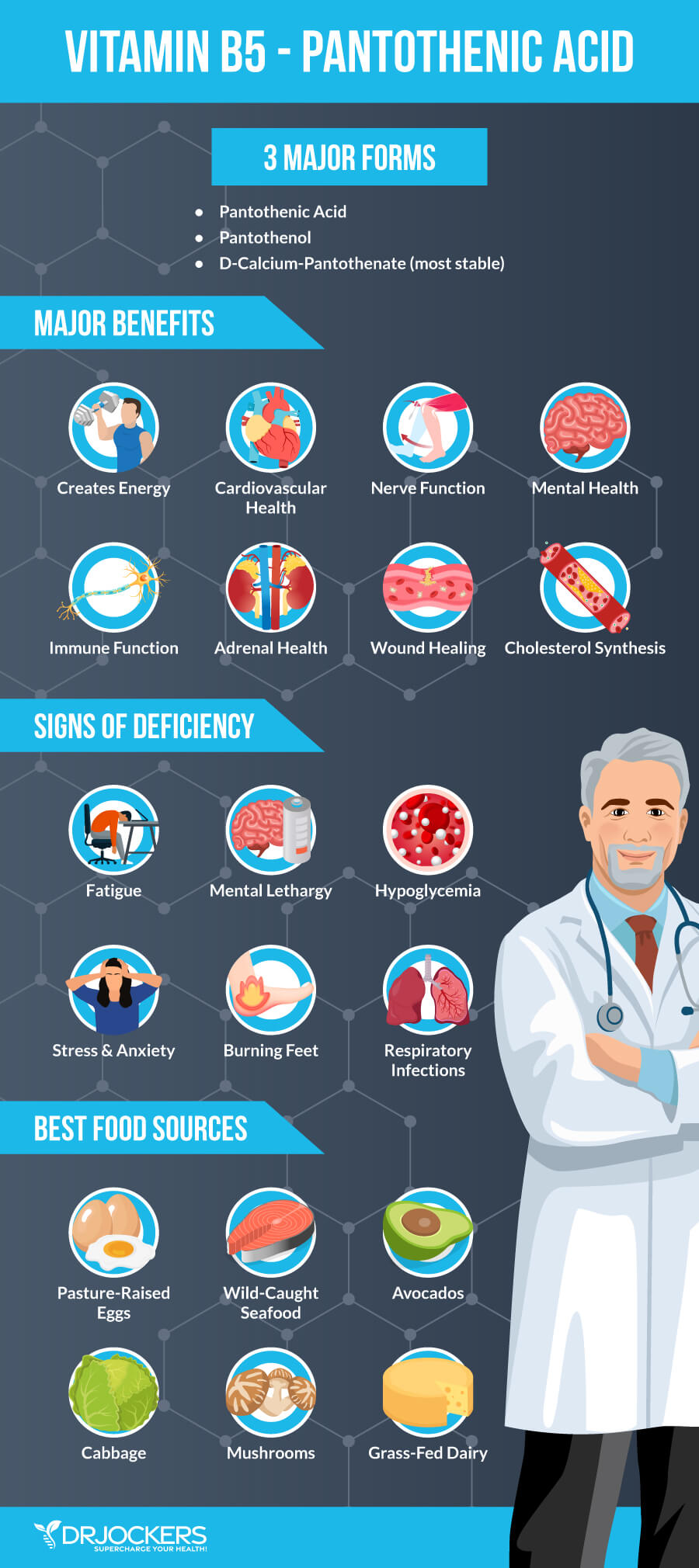
Vitamin B6: Pyridoxine
Vitamin B6 helps to balance sodium and potassium levels. It also allows for healthy red blood cell production. It helps to balance hormonal changes in women and plays a critical role in your immune system function. The best form of supplemental vitamin B6 is pyridoxal 5’phosphate (P5P) (16).
It is also required for your nervous system and mental health. Deficiencies may lead to anemia, nerve pain, skin problems, sores in the mouth, tongue soreness, fatigue, anxiety, depression, cardiovascular issues, and brain degeneration.
Best food sources of vitamin B6 include tuna, wild-caught salmon, pasture-raised chicken, beef liver, and chickpeas.
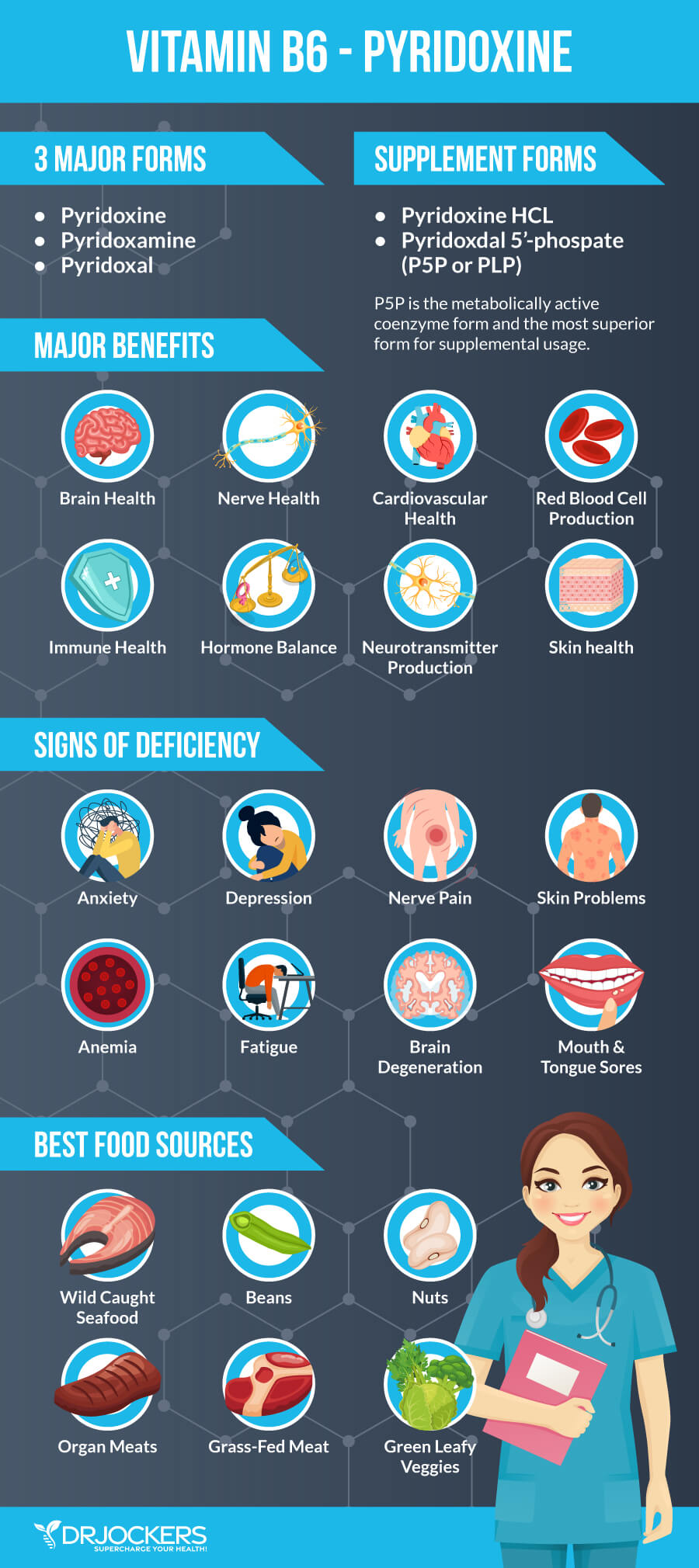
Vitamin B7: Biotin
Vitamin B7 is also known as biotin or vitamin H for its role in hair health. Vitamin B7 cannot be synthesized by human cells, but it is produced by bacteria in the body, and it is present in numerous foods.
Biotin is critical for adrenal function, a healthy nervous system, and proper metabolic processes. It is important for healthy hair, skin, and nails, and is often called the ‘beauty vitamin’ because of that. It helps to control high blood sugar and helps the growing baby during pregnancy.
Signs of overt biotin deficiency include hair loss and a characteristic scaly red rash on the face (around the eyes, nose, and mouth), and in the genital area. Neurologic symptoms in adults have included depression, lethargy, hallucination, numbness and tingling of the extremities, and ataxia
Best food sources of biotin include wild-caught fish, organ meats, nuts and seeds, and pasture-raised eggs.
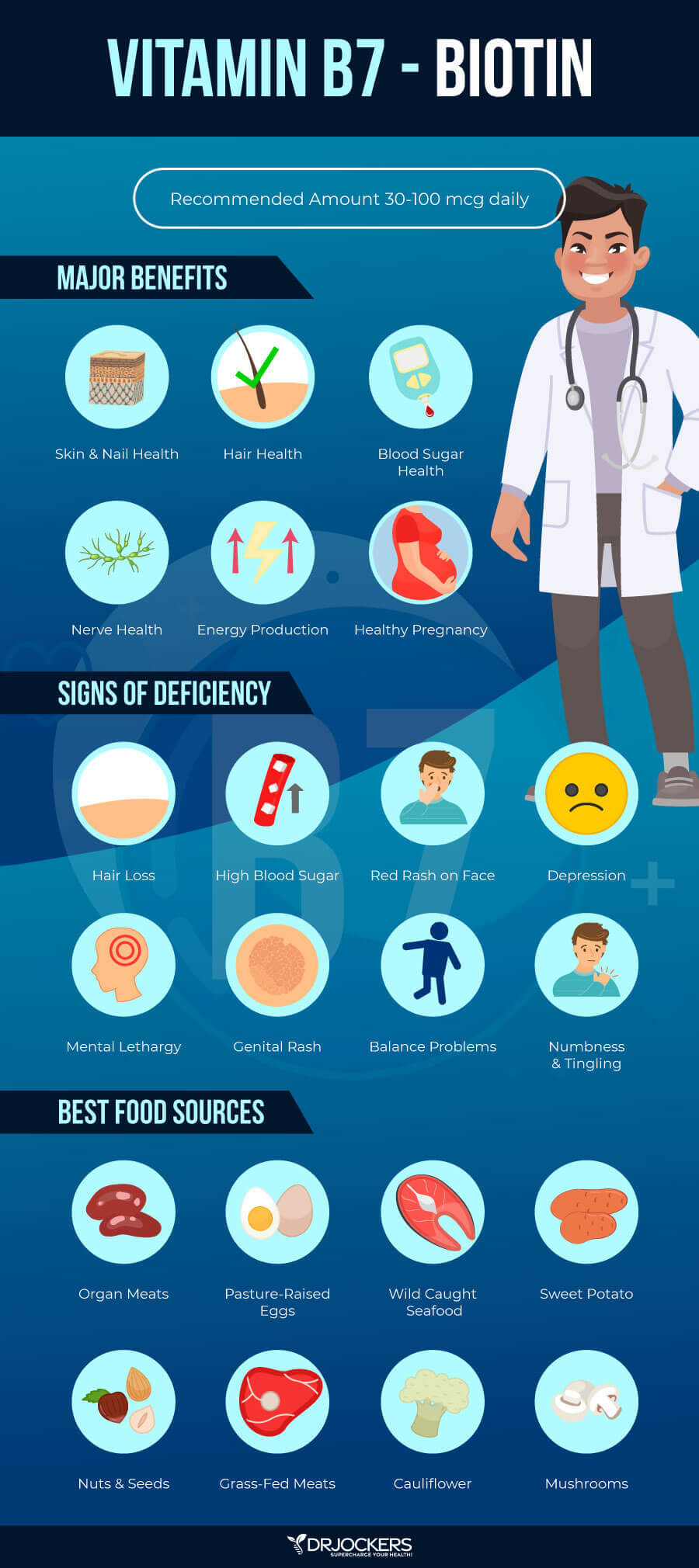
Vitamin B9: Folate
Vitamin B9 is also called folate. Its bioactive forms include folinic acid, calcium folinate, and methyl-folate. Never buy folic acid as a source of vitamin B9, as synthetic folic acid is not natural, can be toxic, and is not effective for those with MTHFR gene mutations.
Folate deficiency is one of the most common vitamin deficiencies due to intestinal disorders, food choices, food processing, and MTHFR mutations. I discuss more about the importance of folate in this article.
Best food sources of folate include asparagus, sprouting broccoli, spinach, avocados, pasture-raised eggs, and liver
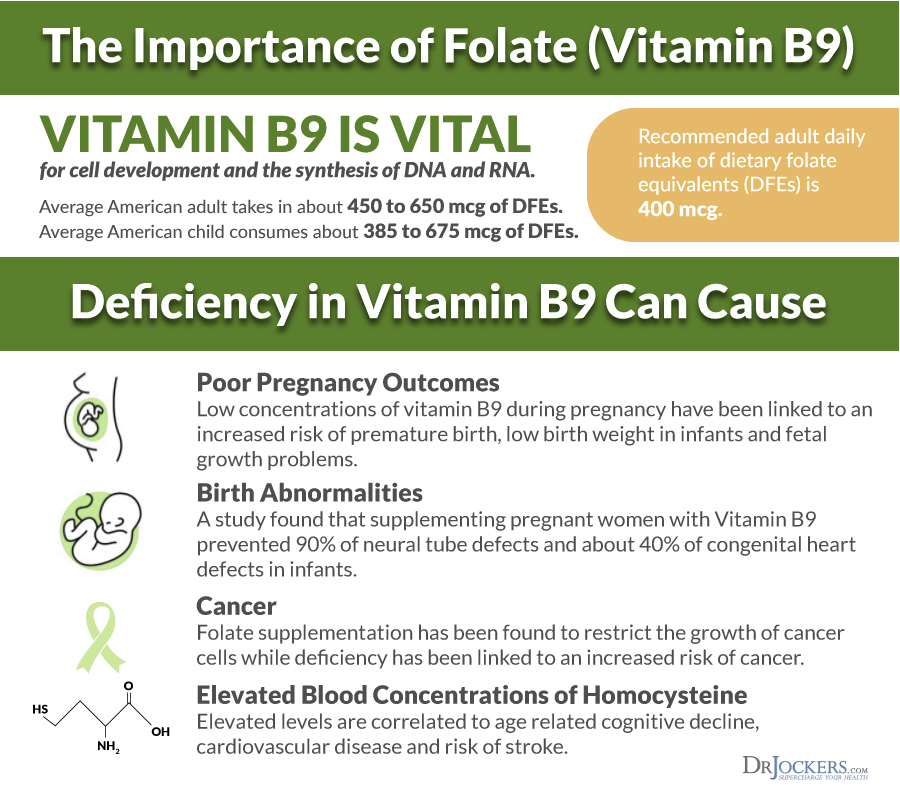
Vitamin B12
Vitamin B12 is critical for healthy nerve function, cardiovascular function, sleep, and blood cell formation. When supplementing with vitamin B12, always use methylcobalamin, not cyanocobalamin, as methyl-cobalamin is the most bioactive form of supplemental vitamin B12.
Best food sources of vitamin B12 include wild-caught fish, grass-fed beef, pasture-raised poultry, and pasture-raised eggs. Plant foods do not contain vitamin B12. As you know, I do not recommend a vegan or vegetarian diet. That said if you are or you have been vegan or vegetarian, supplementing with vitamin B12 is an absolute must.
However, vitamin B12 deficiencies are common among those who eat a diet rich in animal foods as well, making vitamin B12 supplementation important for many people. This is due to issues with low stomach acid that cause poor B12 absorption and/or taking medications that deplete B12 levels.
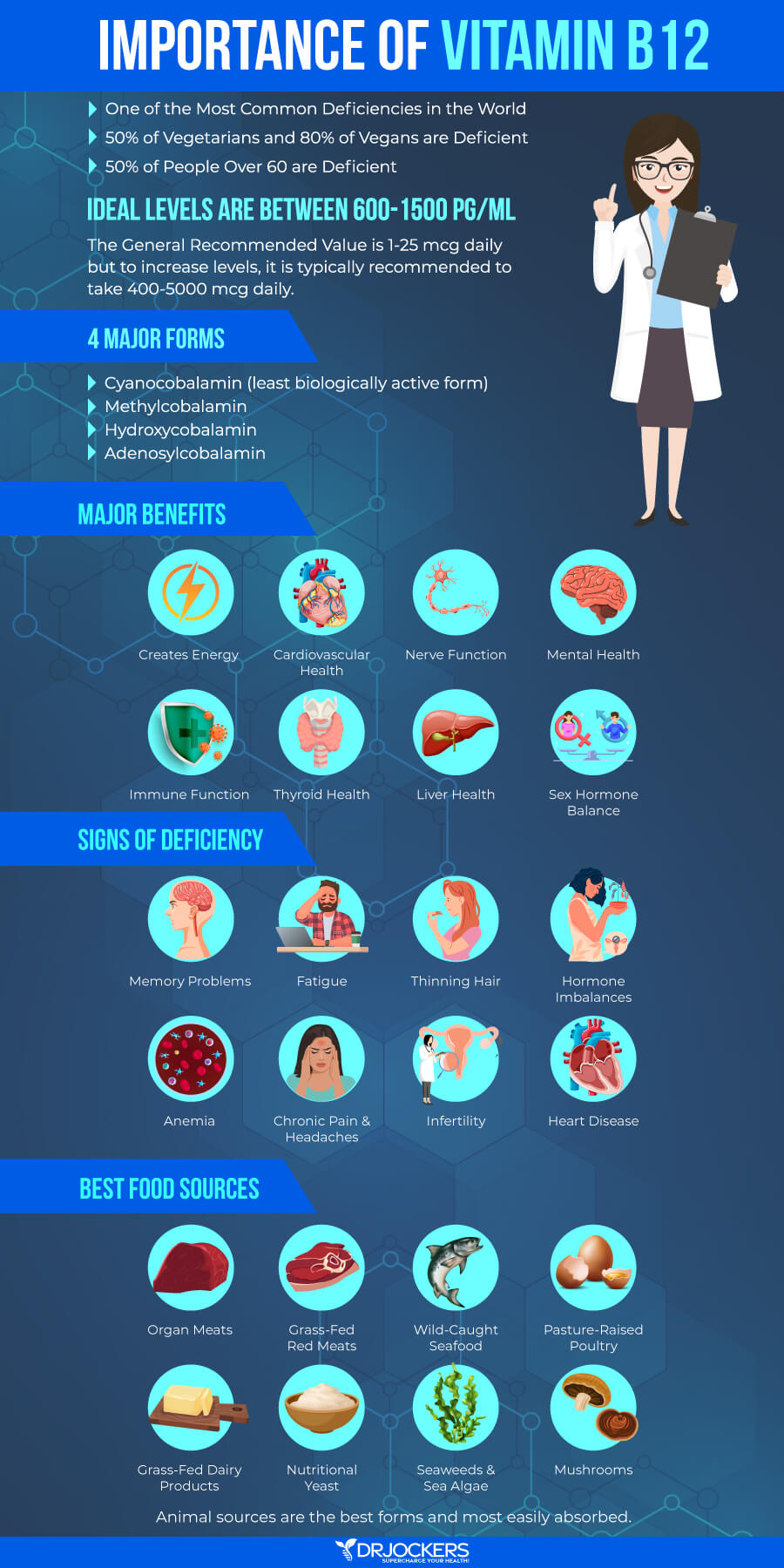
Testing For B Vitamin Levels
Looking at your symptoms, diet, and lifestyle may be a good indication of vitamin B deficiencies as a starting point. However, testing is always the best way to spot vitamin B deficiencies and other potential health issues. Here are the tests I recommend for B vitamin levels.
Blood Work
A Comprehensive Blood Analysis is a fantastic test that can spot all sorts of problems in your body. For B vitamin levels, I specifically use this test to look at your homocysteine, serum folate, and serum B12 levels. This is a simple blood test that offers a comprehensive look at your health at an affordable price.
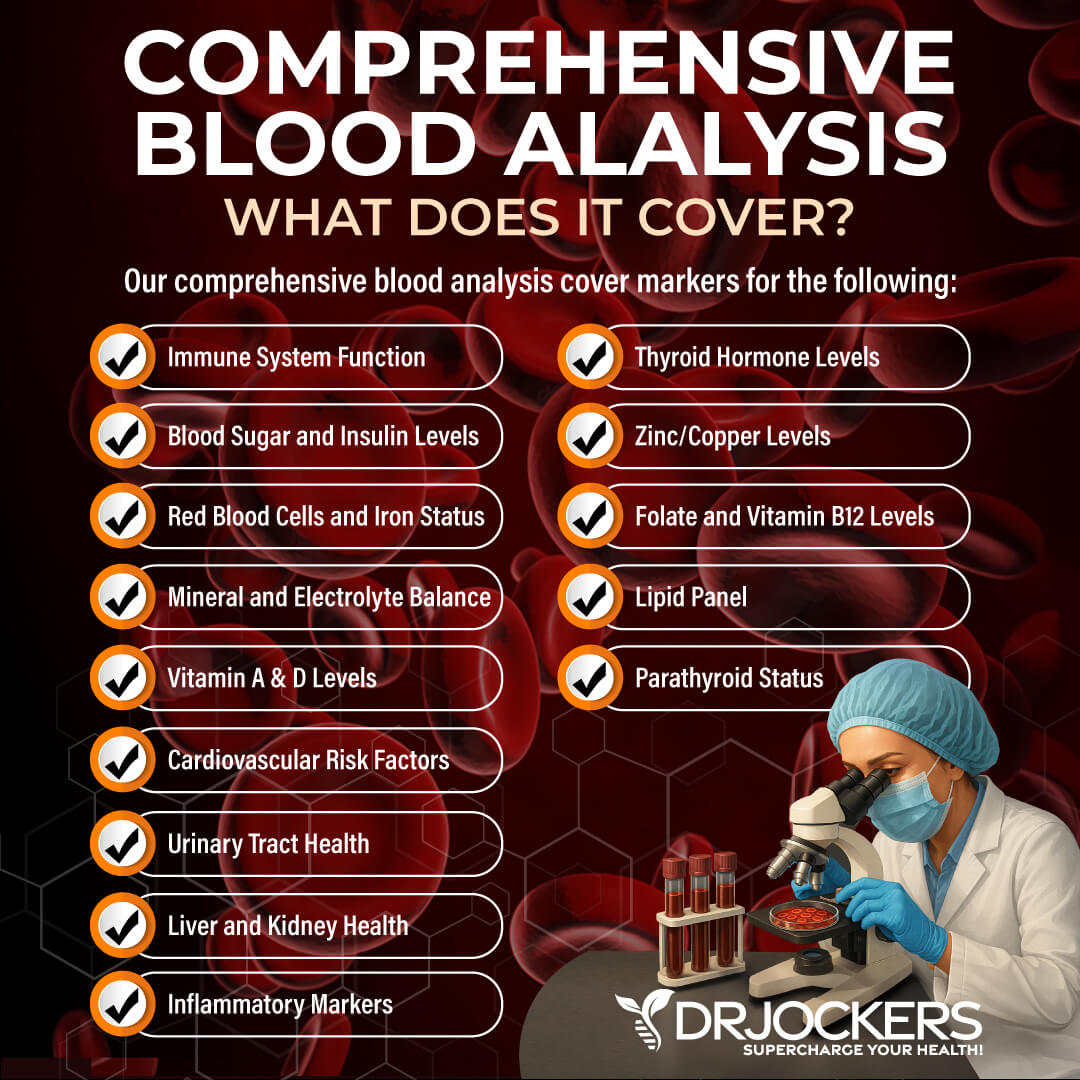
Organic Acid Test
Another blood test I recommend is a Comprehensive Organic Acid Test. This test can help to determine the reasons behind your fatigue, sleep issues, mood changes, depression, anxiety, digestion problems, joint pain, skin issues, and other symptoms.
This is a simple urine test that can tell us a lot about your health and possibly point us to vitamin B deficiencies as well as your mitochondrial health, gut health, glutathione levels, and neurotransmitter levels.
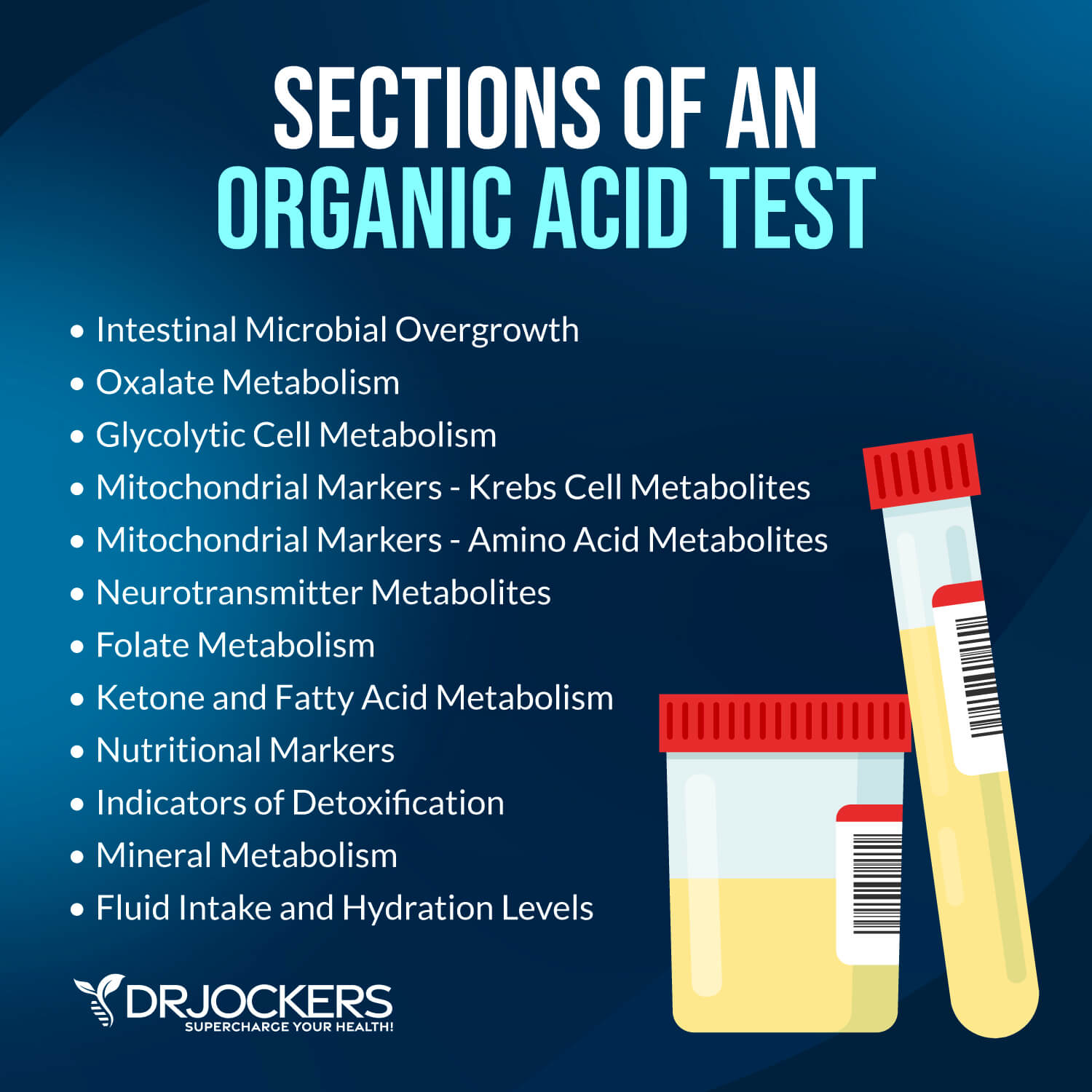
Micronutrient Test
Lastly, I also recommend Micronutrient Testing. This test provides us with a comprehensive nutritional analysis. While it can certainly spot any B vitamin deficiencies by testing for each vitamin B level, it also looks at other vitamins and mineral levels, amino/fatty acids, antioxidants, and metabolites to spot nutritional reasons behind your health issues.
It can point you in the right direction to make necessary dietary changes and what kind of supplementation to use to improve your health.
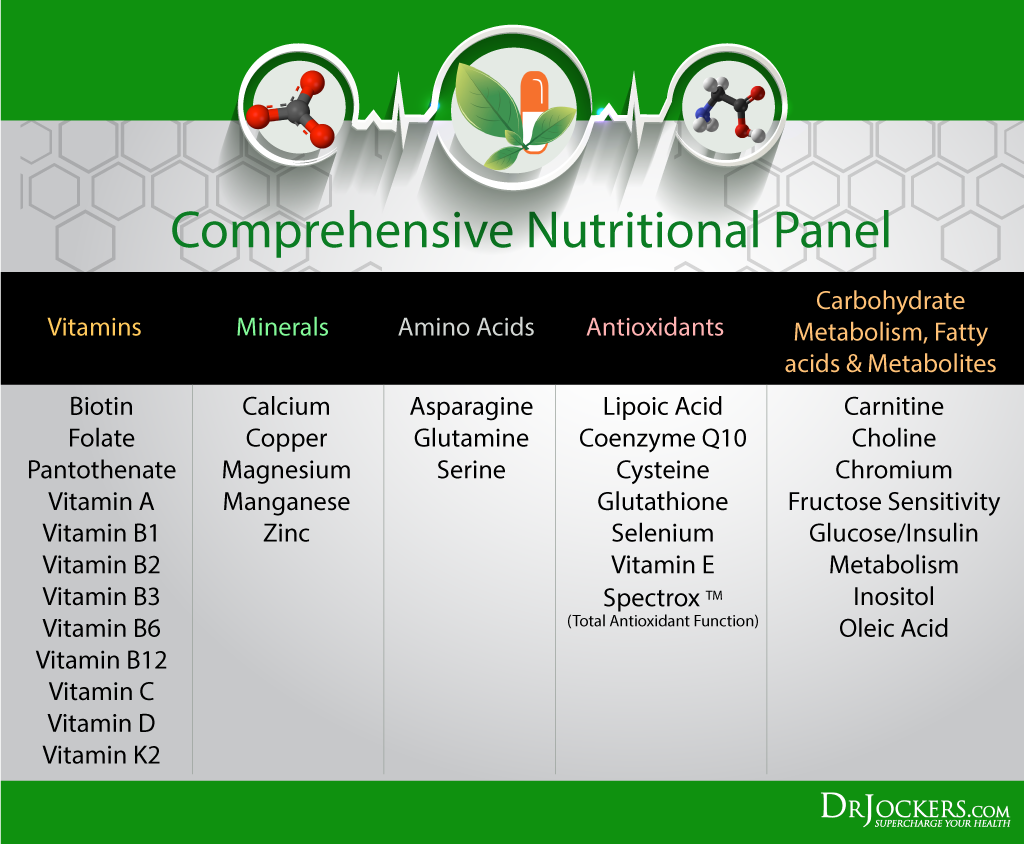
Best Supplemental B Vitamins
Taking B vitamin supplements is not enough. You have to make sure that your body can absorb and use them. Taking high-quality pre-activated forms of B vitamins is important to ensure that they integrate immediately and effectively into your body.
B vitamins are important for your body’s healthy methylation cycle, which helps your body to function both physically and mentally and ensures healthy cardiovascular, nervous system, immune system, hormone function, and detoxification. Taking methylated forms of B vitamins is particularly important if you have MTHFR mutation, however, it is a beneficial and important choice for all (17, 18).
Here are the best B vitamin complex supplements I recommend with pre-activated methylated forms of B vitamins:
B Strong
One of the best supplemental B vitamin complexes I recommend is B Strong. This supplements a necessary dose of each B vitamin using the most bioavailable forms to ensure maximum support for everyone. It also includes added choline for nerve and neurological function, nerve signaling, cell membrane maintenance, and metabolic health.
B Strong helps to support carbohydrate metabolism, blood sugar levels, cardiovascular health, immune health, adrenal function, mood and mental health, nervous system function, and overall well-being. Take one capsule a day for optimal results.
Liposomal Active B Complex
Micelle Liposomal Active B Complex is another vitamin B complex supplement I recommend. Along with all the necessary B vitamins, this supplement also offers an essential mineral and electrolyte blend to support your body.
This liposomal delivery encapsulates the active ingredient into tiny, nano-sized micelles, which are further enveloped in liposomes. These healthy fat cells shield the tiny micelles from the hostile environment in the human gut. The micelles are gradually released, and the B vitamins are deposited near the gut lining, where they can be fully absorbed and offer maximum support.
This supplement is designed to support your sleep, energy levels, mood, and stress response. It is perfect if you are dealing with stress, low energy, or mental health issues. I recommend that you take 1 tablespoon a day. For advanced use and maximum support, you may take up to 3 tablespoons a day.
We have a 30% OFF coupon for you! Visit puralityhealth.com and use the coupon “DRJ” to access 30% OFF!
Final Thoughts
B vitamins are important for your cellular health, brain health, hormonal health, metabolism, skin health, and other areas of your health. B vitamin deficiencies can result in an array of symptoms and health issues, including fatigue, concentration troubles, depression, anxiety, memory problems, weakness, and skin issues.
You can correct these deficiencies through a nutrient-dense diet and supplementation. Try my recommendations for B vitamin supplementation to support your health and well-being.
If you want to work with a functional health coach, I recommend this article with tips on how to find a great coach. On our website, we offer long-distance functional health coaching programs. For further support with your health goals, just reach out and our fantastic coaches are here to support your journey.

Inflammation Crushing Ebundle
The Inflammation Crushing Ebundle is designed to help you improve your brain, liver, immune system and discover the healing strategies, foods and recipes to burn fat, reduce inflammation and Thrive in Life!
As a doctor of natural medicine, I have spent the past 20 years studying the best healing strategies and worked with hundreds of coaching clients, helping them overcome chronic health conditions and optimize their overall health.
In our Inflammation Crushing Ebundle, I have put together my very best strategies to reduce inflammation and optimize your healing potential. Take a look at what you will get inside these valuable guides below!





Just an FYI, but when I click on a link above about the Complete Blood Analysis that page will not let me return to this one, so I have to start again, finding the Vit B article. Just something funky in the hyperlinks.
The issue is actually when I click to download the sample test results. It downloads the sample twice and deletes this main article page. Since I’m seriously considering ordering all three tests as a present to myself I’d be happy to get a discount for debugging the webpage!
Dr Jockers, please help
Thank you, Dr. Jockers for always sharing comprehensive information about health topics. God bless you & your loved ones.👍❤️
Thank you Wilhelmina! Blessings to you!
It’s hard for me bc in beginning I had too much dopamine. With mental meds I have other issues. It’s crazy.
I just love all your articles, Thank You so very much.
Thanks Cynthia!
Thanks for that info, injoyed reading it all , very interesting
Glad to hear that!
Thank you Cynthia!
Thanks Dr. Jockers. Excellent information with such generosity. Is bistro good available in Canada. I find it so difficult to take all the b vitamins individually. Thank you.
Thank you Connie! Blessings to you!
Thank you so much, Dr. Jockers! So much precious information all in one article. I can’t imagine having to carry it all together all by myself.
Thank you for your support!
How do I purchase your B12 and B complex?
You can go to our store page here: https://store.drjockers.com/products/b-strong
Hey Dr. Jockers, love your website and appreciate your commitment to helping individuals live a healthy life and become their best person! My question is about tablets/capsules vs. powder vs. liquid vitamins (sublingual). I have been told that I might not be digesting my tablet/capsule vitamins and may be better suited for liquid vitamins. What are your thoughts on the delivery systems for best absorption?
Yes this is possible. In some cases, some individuals do well with liquid liposomal nutrients. This is why we carry both of them.
Hi, thanks for another great article. I recently had a lot of blood work done, but it unfortunately lacked a lot of nutrients I’m interested in. I see you list the Comprehensive Blood Panel, Organic Acid Test, and Micronutrient Panel. Below that is a graphic titled Comprehensive Nutritional Panel, but no description of this. Is the “Comprehensive Nutritional Panel” what you get when you do all three (Blood, Acid and Micronutrient)? Or is it a separate test? I’m interested in all the Bs, A, K, zinc/copper/mag, along with most other useful info from the above tests.
Thanks!
Hello Zach, that is all in the Micronutrient test.
Are there no Vit B4, B8, B10, B11and beyond B12? I appreciate that you give detailed info on the health topics you discuss about.
Great article! What are your recommendations for b vitamin complex for those of us with Alpha Galactose? I can’t ingest anything mammal. And not knowing how to get proper nutrition is taking it’s toll on my body. Chicken and turkey are mixed with fat from mammals and my food sources are limited. Anaphylaxis from a daily vitamin and toothpaste is no joke, not something I ever want to experience again! Are there recommendations for Vegan Vitamins?
Sorry to hear this! I would find a functional health practitioner that understands this condition and can help customize a plan for you! https://drjockers.com/functional-nutrition-tips-to-find-a-great-health-coach/
I have not been able to get anyone to answer questions for me. I have serious issues with my B vit deficiency and I have diarrhea again because my mag capsules are not digesting to help my body. I’ll be 75 on Oct 5th this week and desperately need some help. PLEASE!!!
Hello Jan, please reach out to one of our functional health coaches here: https://drjockers.leadpages.co/long-distance-coaching-dr-jockers/
Is it possible for B12 shots to cause anxiety?
Lyme and Babesia present, acute severe anxiety at the moment, which I have never had. Was wondering if my shots could be causing?
Yes that is definitely possible! Too much methylation can cause anxiety!
What can you do for B12 if you have pernicious anemia -is there a way of reversing this so I can absorb B12 again without injections
Sublingual B12 is much better than the old technology of injections and they don’t go near the stomach if they’re taken properly.
Yes, we recommend doing sublingual B12 which absorbs in your mouth and bypasses the digestive tract. Take out B12 Power: https://store.drjockers.com/products/b12-power
I am so happy to find your article. Now I am sure that I have B vitamin deficiencies.I have had many health problems for a long time and having more problems.
About four years, I was diagnosed “Darmatomyositis” and took many medications included steroid, antibiotics, and folic acid. Last year, I took two antibiotics and had diarrhea. Since then I have had a bright yellow urine and not been feeling well. I asked my doctor to have blood test about B vitamin a couple weeks ago. He completely ignored me. Right now I have been looking for a multivitamin and a B -complex.
I cannot find anybody to help me. Please give me some advice!! I am sorry about my bad English. Because English is not my language.
Very sorry to hear about this! I would suggest working with a functional health practitioner, we have a great team that works with people all over the world: https://drjockers.lpages.co/long-distance-coaching-dr-jockers/
6/14 Thank you Dr.Jockers for the very informative and in depth topic of Vit B,the Lord so blessed you with knowledge to help folks like me.Iam a retired Oncology nurse and very much understand your wealth of info which I dont read on 100% of Natural docs like you.For adults and seniors what are the essential supplements we need to take daily?With endless supplements how can one discern which one to take?What is good for osteoarthritis?Confused about collagen and protein drink?
Yes, I would recommend a good multi-vitamin, gut and liver support product as well as extra B Vitamins, Vitamin D3/K2 and magnesium.
T.Y. Dr J. Very detailed, and informative. Greatly appreciate. I love how you list the symptoms, and solutions.
Dear Dr. Jockers:
Do you have anything for neuropathy. My feet and calves are swollen all do I can feel the nerves in my feel and calves tingling all day. It is if they cannot connect with one another. If I did not eat healthy food for a long enough period of time, (~ 4 months) could that cause it?
What do I need to do to repair it, if that is possible. I am 75 years old and I have not been very active for the last several months due to a couple of accidents in which I broke a couple of bones in my left foot and a few months later the collar bones in my right shoulder.
Thank-you for your time.
Yours
truly,
Bruce McEachern
If we are on a methylated multivitamin already to support my MTHFR gene mutation effects, should we also do this supplement additionally ?